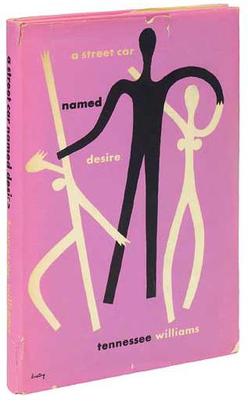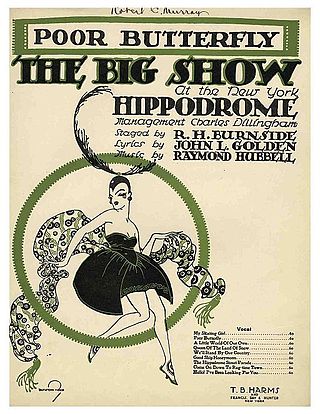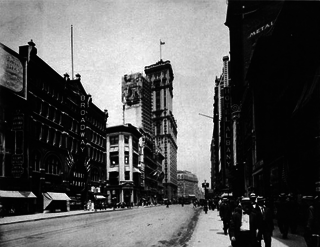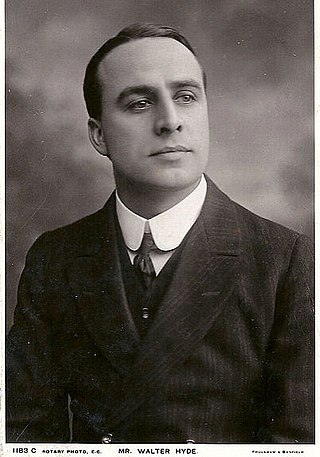
A Streetcar Named Desire is a play written by Tennessee Williams and first performed on Broadway on December 3, 1947. The play dramatizes the experiences of Blanche DuBois, a former Southern belle who, after encountering a series of personal losses, leaves her once-prosperous situation to move into a shabby apartment in New Orleans rented by her younger sister Stella and brother-in-law Stanley.

Mary William Ethelbert Appleton Burke was an American actress who was famous on Broadway and radio, and in silent and sound films. She is best known to modern audiences as Glinda the Good Witch of the North in the Metro-Goldwyn-Mayer movie musical The Wizard of Oz (1939).

Dame Esmerelda Cicely Courtneidge, was an Australian-born British actress, comedian and singer. The daughter of the producer and playwright Robert Courtneidge, she was appearing in his productions in the West End by the age of 16, and was quickly promoted from minor to major roles in his Edwardian musical comedies.

Lew Fields was an American actor, comedian, vaudeville star, theatre manager, and producer. He was part of a comedy duo with Joe Weber. He also produced shows on his own and starred in comedy films.

Arthur Reed Ropes, better known under the pseudonym Adrian Ross, was a prolific writer of lyrics, contributing songs to more than sixty British musical comedies in the late 19th and early 20th centuries. He was the most important lyricist of the British stage during a career that spanned five decades. At a time when few shows had long runs, nineteen of his West End shows ran for over 400 performances.

John Raymond Hubbell was an American writer, composer and lyricist. He is best known for the popular song, "Poor Butterfly".
Since 1878, there have been two Broadway theatres that have carried the name the Bijou Theatre during their histories.

Blanche Ring was an American singer and actress in Broadway theatre productions, musicals, and Hollywood motion pictures. She was best known for her rendition of "In the Good Old Summer Time."

Charlotte "Lotta" Faust was an American actress, dancer, and singer. She performed an interpretation of the Salome dance based on the play Salome (1893) by Oscar Wilde.

The Casino Theatre was a Broadway theatre located at 1404 Broadway and West 39th Street in New York City. Built in 1882, it was a leading presenter of mostly musicals and operettas until it closed in 1930.

Lawrence Randall Grossmith was an English actor, the son of the Gilbert and Sullivan performer George Grossmith and the brother of the actor-manager George Grossmith Jr.

Glen MacDonough was an American writer, lyricist and librettist. He was the son of theater manager Thomas B. MacDonough and actress/author Laura Don. Glen MacDonough married Margaret Jefferson in 1896 in Buzzard's Bay, Massachusetts.
Miss 1917 is a musical revue with a book by Guy Bolton and P. G. Wodehouse, music by Victor Herbert, Jerome Kern and others, and lyrics by Harry B. Smith, Otto Harbach, Henry Blossom and others. Made up of a string of vignettes, the show features songs from such musicals as The Wizard of Oz, Three Twins, Babes in Toyland, Ziegfeld Follies and The Belle of New York.

Coralie Blythe, was an English actress and singer, who is best remembered for her numerous postcard photos and her roles in Edwardian musical comedy. Although she never became a big star, she worked steadily in London's West End and in British provincial theatres from her teen years until after World War I, especially for producer George Edwardes, and had a few roles in America. She sometimes performed with her husband, Lawrence Grossmith, and her brother, Vernon Castle.

John Lionel Golden was an American actor, songwriter, author, and theatrical producer. As a songwriter, he is best-known as lyricist for "Poor Butterfly" (1916). He produced many Broadway shows and four films.

Vera Michelena was an American actress, contralto prima donna and dancer who appeared in light opera, musical comedy, vaudeville and silent film. She was perhaps best remembered for her starring roles in the musicals The Princess Chic, Flo Flo and The Waltz Dream, her rendition of the vampire dance in the musical Take It from Me and as a Ziegfeld Follies performer.

The Broadway Theatre near 41st Street was a Manhattan theatre in operation from 1888 to 1929. It was located at 1445 Broadway.

The Belle of Brittany is an Edwardian musical comedy in two acts set in 'Daffodil Time' in rustic 18th-century Brittany. It premiered at the Queen's Theatre in London on 24 October 1908. The music is by Howard Talbot and Marie Horne, to a book by Leedham Bantock and P. J. Barrow, with lyrics by Percy Greenbank. A Broadway production opened at Daly's Theatre in New York in November 1909 and ran for 72 performances. It featured Josephine Brandell and Margaret Dumont in early roles.

Walter Hyde was a British tenor, actor and teacher of voice whose career spanned genres from musical theatre to grand opera. In 1901 he sang Borrachio in the premiere of Stanford's Much Ado About Nothing and soon appeared in London's West End in light opera and Edwardian musical comedy. He appeared regularly at the Royal Opera House in Covent Garden between 1908 and 1924, becoming known for roles in Wagner operas, among others, both in Britain and America. He was also in demand as a concert artist. In his later years he was Professor of Voice at the Guildhall School of Music where his students included Geraint Evans and Owen Brannigan.
Hitchy-Koo is a 1912 American popular song and a series of musical revues, inspired by the song, staged on Broadway each year from 1917 through 1920 and on tour in 1922.

















